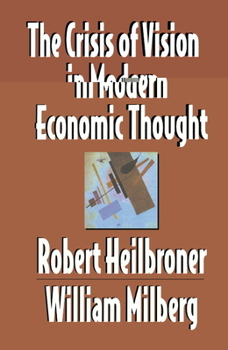The Crisis of Vision in Modern Economic Thought
Select Format
Select Condition 
Book Overview
A deep and widespread crisis affects modern economic theory, a crisis that derives from the absence of a vision--a set of widely shared political and social preconceptions--on which all economics ultimately depends. This absence, in turn, reflects the collapse of the Keynesian view that provided such a foundation from 1940 through the early 1970s, comparable to earlier visions provided by Smith, Ricardo, Mill, and Marshall. The unraveling of Keynesianism...
Format:Paperback
Language:English
ISBN:0521497744
ISBN13:9780521497749
Release Date:January 1996
Publisher:Cambridge University Press
Length:144 Pages
Weight:0.40 lbs.
Dimensions:0.4" x 6.2" x 7.8"
Customer Reviews
1 rating
For Keynes.
Published by Thriftbooks.com User , 22 years ago
The authors are harsh for today's US economists, because they have lost contact with the social reality: "the extraordinary combination of arrogance and innocence with which mainstream economics has approached the problems of a nation that had experienced twenty years of declining real wages, forty percent of whose children live in "absolute" poverty, and which endured an unprecedented erosion of health, vacation, and pension benefits. The commitment to full employment legislated in 1946 has been "honored" in these socially destructive years ... by redefining "full" employment as a higher level of unemployment."(p.6)The solution of the authors is government intervention in the economy and a re-evaluation of the public sector, although they recognize that Keynesianism was and is not perfect: it was unable to present a coherent theory of inflation; it failed to include a concept of stagflation; and its treatment of the money supply could lead to inflation.But in fact, the US government intervenes already heavily in the economy, but for the authors not in the right sector: defence.This book, written in 1995, contains already the central proposition of 'The Silent Takeover' by Noreena Hertz: "On a wold wide scale, this internationalization of finance seriously limits the ability of advanced nations to carry out domestic fiscal and monetary policies that are not compatible with the "will" of a stateless world financial market." (p.120)Their world vision was correct, but too timid: "On a still lager front, world population growth threatens to bring another billion people into existence within a generation, raising the spectre of large immigration pressures for the advanced world ... Ecological problems ... the forces of ethnic and nationalist unrest ... together with sporadic terrorism." (p.120-121)It is evident that the above mentioned problems can only be resolved by political intervention. The proceeds of the successes of the market economy can only be redistributed or guided by political decisions, by politicians, not by, but with the help of, economists. The problem is that no international authority has enough power to impose his decisions unilaterally on national states.Ultimately, the decisions lay in the hands of the voters. If a majority votes for a certain direction, the political authorities have to follow, otherwise they will loose their mandate.This is a thought provoking book.





